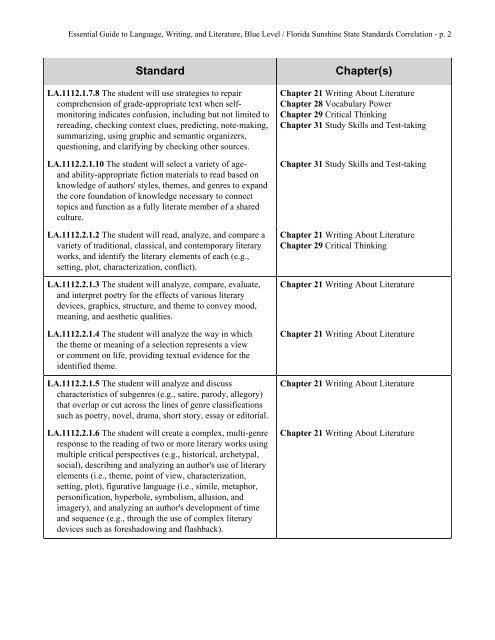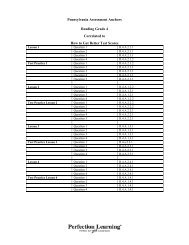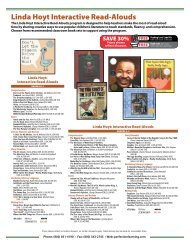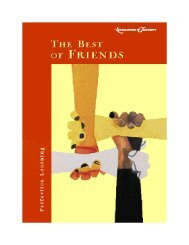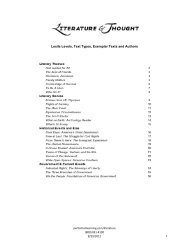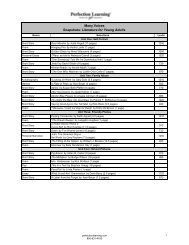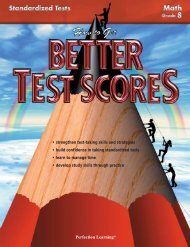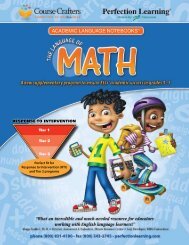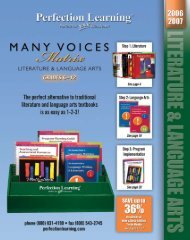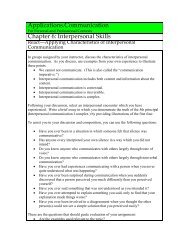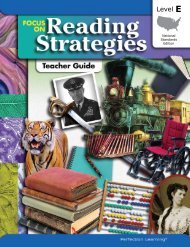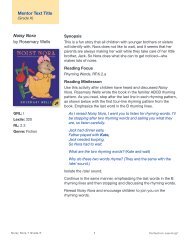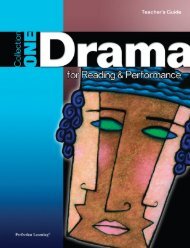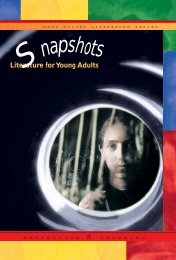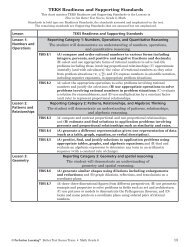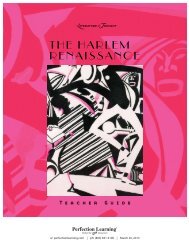Florida Sunshine State Standards (Grade 12) - Perfection Learning
Florida Sunshine State Standards (Grade 12) - Perfection Learning
Florida Sunshine State Standards (Grade 12) - Perfection Learning
You also want an ePaper? Increase the reach of your titles
YUMPU automatically turns print PDFs into web optimized ePapers that Google loves.
Essential Guide to Language, Writing, and Literature, Blue Level / <strong>Florida</strong> <strong>Sunshine</strong> <strong>State</strong> <strong>Standards</strong> Correlation - p. 2<br />
Standard<br />
LA.11<strong>12</strong>.1.7.8 The student will use strategies to repair<br />
comprehension of grade-appropriate text when selfmonitoring<br />
indicates confusion, including but not limited to<br />
rereading, checking context clues, predicting, note-making,<br />
summarizing, using graphic and semantic organizers,<br />
questioning, and clarifying by checking other sources.<br />
LA.11<strong>12</strong>.2.1.10 The student will select a variety of ageand<br />
ability-appropriate fiction materials to read based on<br />
knowledge of authors' styles, themes, and genres to expand<br />
the core foundation of knowledge necessary to connect<br />
topics and function as a fully literate member of a shared<br />
culture.<br />
LA.11<strong>12</strong>.2.1.2 The student will read, analyze, and compare a<br />
variety of traditional, classical, and contemporary literary<br />
works, and identify the literary elements of each (e.g.,<br />
setting, plot, characterization, conflict).<br />
LA.11<strong>12</strong>.2.1.3 The student will analyze, compare, evaluate,<br />
and interpret poetry for the effects of various literary<br />
devices, graphics, structure, and theme to convey mood,<br />
meaning, and aesthetic qualities.<br />
LA.11<strong>12</strong>.2.1.4 The student will analyze the way in which<br />
the theme or meaning of a selection represents a view<br />
or comment on life, providing textual evidence for the<br />
identified theme.<br />
LA.11<strong>12</strong>.2.1.5 The student will analyze and discuss<br />
characteristics of subgenres (e.g., satire, parody, allegory)<br />
that overlap or cut across the lines of genre classifications<br />
such as poetry, novel, drama, short story, essay or editorial.<br />
LA.11<strong>12</strong>.2.1.6 The student will create a complex, multi-genre<br />
response to the reading of two or more literary works using<br />
multiple critical perspectives (e.g., historical, archetypal,<br />
social), describing and analyzing an author's use of literary<br />
elements (i.e., theme, point of view, characterization,<br />
setting, plot), figurative language (i.e., simile, metaphor,<br />
personification, hyperbole, symbolism, allusion, and<br />
imagery), and analyzing an author's development of time<br />
and sequence (e.g., through the use of complex literary<br />
devices such as foreshadowing and flashback).<br />
Chapter(s)<br />
Chapter 21 Writing About Literature<br />
Chapter 28 Vocabulary Power<br />
Chapter 29 Critical Thinking<br />
Chapter 31 Study Skills and Test-taking<br />
Chapter 31 Study Skills and Test-taking<br />
Chapter 21 Writing About Literature<br />
Chapter 29 Critical Thinking<br />
Chapter 21 Writing About Literature<br />
Chapter 21 Writing About Literature<br />
Chapter 21 Writing About Literature<br />
Chapter 21 Writing About Literature


